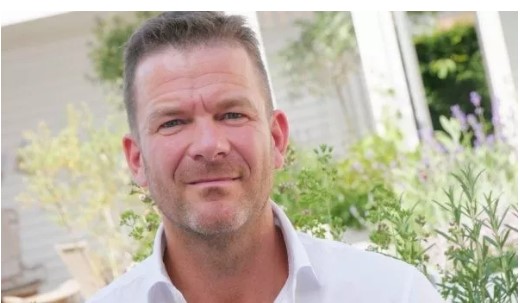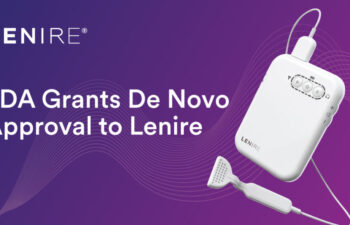Meet the provider: Thomas Borgå, Specialklinikken Borgå, Denmark

Meet the provider
Introducing Lenire Partner Thomas Borgå, Specialklinikken Borgå, Denmark
Specialklinikken Borgå‘s owner and clinic manager, Thomas, is Denmark’s most experienced tinnitus therapist. In addition to offering tinnitus treatments, Thomas is also a lecturer, eye specialist and one of Denmark’s leading acupuncturists.
Tell us about tinnitus specialist, Thomas Borgå:
When I was 12, during a summer holiday, I bought an American book about reflexology. Reflexology was a very controversial form of treatment at the time in the mid-eighties.
I couldn’t stop reading it all summer long and I could not stop telling my family about it. The idea of being able to help people suffering from ailments or diseases, without needing medication or surgery, but simply by stimulating specific points throughout the body, seemed wildly exciting to me.
After finishing school, I completed an education as an acupuncturist and was quickly hired by various larger companies to treat their employees. When I was in my mid-twenties, my days were already booked with treatments from early morning until late.
The financial crisis hit hard on my corporate clients, and in 2010 I went a different path and opened a private clinic in a beautifully restored old building in the centre of my hometown, in the middle of Jutland, in the western part of Denmark.
It turned out to be a good decision. Within a few years, patients arrived from all over the country, staying overnight in hotels and holiday homes. In 2017, I, therefore, bought a large villa and we were then able to offer treatment stays with accommodation.
I am currently 47 years old. I have a leisure farm on the island of Fur, in the Limfjord. I have three sons, a girlfriend, and the best job I could imagine.
How did you become interested in tinnitus and tinnitus treatment?
Through the years, I have always been interested in disorders that are neglected by the public health system, where patients are left to hopelessness and a “learn to live with it” advice. Tinnitus is one of the disorders that affect the quality of life for many people enormously but has for many years been almost impossible to treat, either medically or by other means.
But I have always been quite curious and inquisitive by nature. Even though Denmark is a highly developed country, I believe that we Danes can still learn a lot by taking more interest in what is going on outside our little kingdom. So, over the years, I have travelled, primarily in Europe, to look for new and effective treatment methods that could be introduced in Scandinavia.
Thus, in 2016, I came across a concept for tinnitus treatment on a trip to Berlin, which sounded promising. After more than half a year of training, we launched the treatment in Denmark.
We managed to help a fairly large proportion of the patients a lot, and this gave hope both to the patients and to us because although the patients were not cured of tinnitus, we still helped the patients so much that they achieved a significantly better quality of life.
Unfortunately, the treatment took a long time and required both a disciplined effort from the patient and patience, but it had a positive impact on the vast majority – even if they were de facto given up by the established health system.
It gave me the courage to continue working with tinnitus and invest in building a serious and credible clinic around modern tinnitus treatment.
I wanted a clinic where we could take care of patients with acute tinnitus and attempt to reverse the negative stress spiral, sound sensitivity, tinnitus and poor night’s sleep. These factors combine into a self-reinforcing and toxic tinnitus cocktail if you don’t get it turned around.
Today, tinnitus treatment has become my path. There are so many people out there who need help so badly and get nothing more but the advice to “learn to live with it”. In most cases, we can definitely do more for them.
Why did you decide to offer patients the Lenire tinnitus treatment device?
For many years I had followed with interest the studies surrounding both Lenire and other tinnitus trials. It was indicated that stimulation of the vagus nerve in combination with sound therapy could be the best possible way for the future treatment of tinnitus.
If one assumes that this combination is an effective way to improve tinnitus, tongue stimulation is the optimal way to affect the vagus nerve. The tongue is a muscle surrounded by a membrane and a moist environment. As a result, the transmission of electrical impulses thereby takes place far more directly and with less loss than if the vagus nerve is stimulated outside the body.
Since Lenire is the market’s only approved device for tongue stimulation, and the equipment seemed very professional and well-made, it was with great pride that we could introduce Lenire to the Danish market.
But just as important, in the many initial meetings with Neuromod Devices, I got a clear impression that the company behind it had not only done extensive research but also had a lot of practical knowledge about tinnitus treatment, with all the aspects around psychology, lifestyle and other factors that are often needed to keep an eye on, if the treatment is to be successful and sustainable.
I am convinced that Neuromod measured its success primarily on the improvement of the patient’s quality of life and less on the short-term goals of a large-scale sale. I therefore felt that our values, understanding of the complexity of tinnitus treatment and overall goals were similar. It is a professional collaboration that I have come to value very much.
Why is it so important that treatment is supervised by a tinnitus expert?
Tinnitus treatment is different from all other types of treatment. Patients affected by tinnitus usually go through several stages:
In the acute phase, they are often affected by anxiety about worsening or fear that they will never get rid of their tinnitus.
This stress and anxiety intensify the tinnitus and can become a vicious cycle that is difficult to break. In this phase, it is extremely important to secure a good night’s sleep, create trust and realistic hope and temper expectations.
After this, it is important to start treatment so that a physical improvement occurs as quickly as possible, because the physical improvement will affect the psychological one, and the patient will have a bad spiral turned into a good one.
Patients who have been suffering from tinnitus for many years are typically in a completely different situation.
Tinnitus patients can in some way be compared to chronic pain patients who have learned to live with their condition over time, but at the expense of their energy and their quality of life.
Those patients have often tried all sorts of different treatments, medications and well-intentioned advice, usually without effect. Those patients need completely different treatment than the acutely affected.
This is an example of tinnitus being a complex condition, of physical and psychological factors that often cannot be separated.
If we as therapists are to create a positive improvement of tinnitus for our clients, it is important that we understand all these factors, otherwise, we will not reach our goal. It requires that you, as a therapist, take an interest in tinnitus and the people who are affected by it, and that understanding or insight if you will, is easier to achieve if you work dedicatedly with tinnitus every single day.
What was your greatest success with Lenire tinnitus treatment?
In the great cases, we find that tinnitus is reduced to a fourth or fifth in just 3 months, and often also that the patient’s hearing improves, and sound sensitivity disappears.
In practice, we have seen that patients go from tinnitus being an overriding negative factor in their lives, to something that they do not attach any importance to.
Read: TrustPilot tinnitus patient reviews of SpecialKlinikken Borgå
And again, compared to pain patients, it is comparable to going from abnormal constant pain threatening to destroy your life to just some minor tensions in your back.
Book a Tinnitus Assessment with Specialklinikken Borgå
Book an initial tinnitus assessment with Thomas at Specialklinikken Borgå and receive expert advice on how to manage and treat your tinnitus. Book directly on Specialklinikken Borgå’s website or use Lenire’s Find a Clinic Map.



